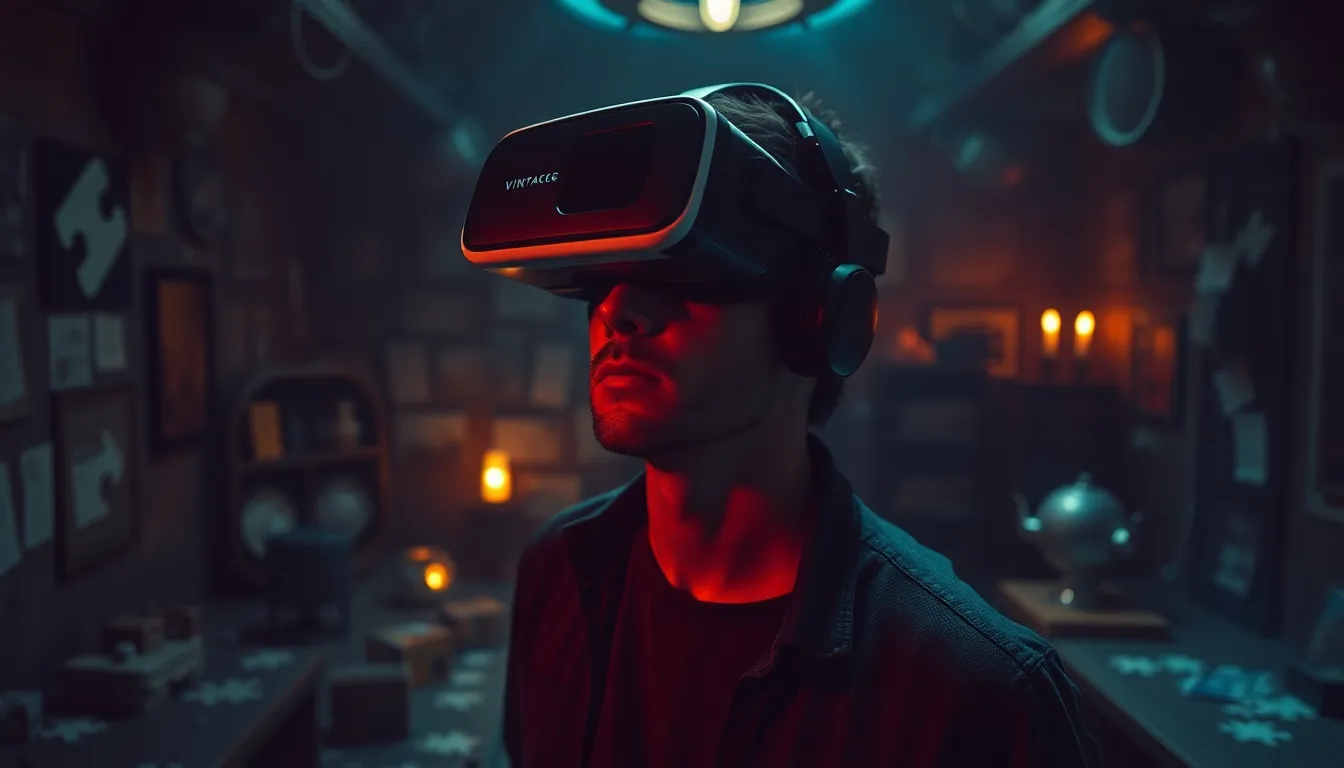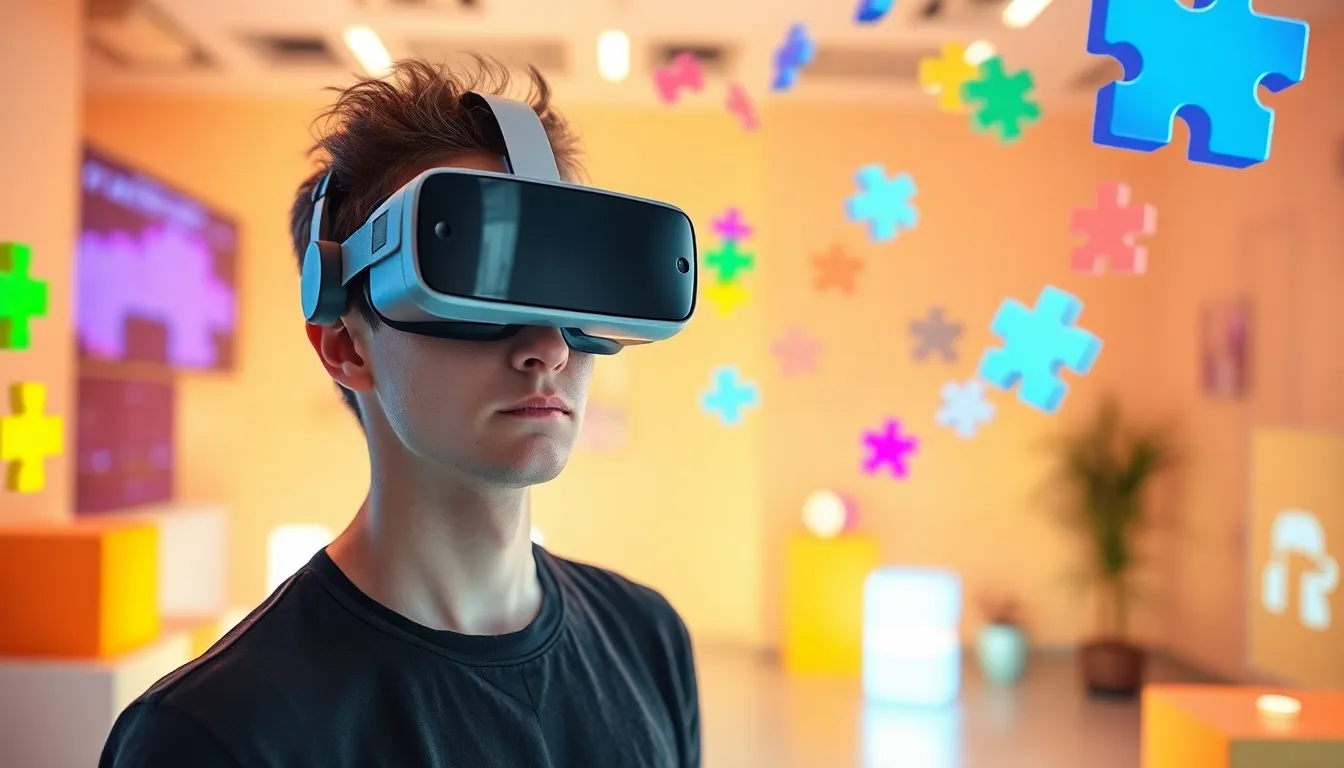Imagine stepping into a world where the only thing standing between you and victory is a series of mind-bending puzzles. VR puzzle games transport players into immersive environments where every twist and turn challenges their wits. Gone are the days of staring at a screen while solving a jigsaw; now, he or she can physically interact with their surroundings, making every solved riddle feel like a personal triumph.
Table of Contents
ToggleOverview of VR Puzzle Games
VR puzzle games take immersive gameplay to new heights. These games combine traditional puzzle mechanics with the unique capabilities of virtual reality. Players often find themselves transported into meticulously crafted worlds, where they interact with their surroundings in real-time.
Interaction and physical engagement distinguish these games from their non-VR counterparts. Players manipulate objects, solve intricate puzzles, and navigate challenges within a 3D space. This setup enhances the player’s sense of presence and agency, creating an experience that feels genuinely rewarding.
Numerous titles exist in the VR puzzle genre, showcasing diverse themes and mechanics. Popular games, like “The Room VR: A Dark Matter,” emphasize physical manipulation and environmental clues. Others, like “I Expect You To Die,” incorporate elements of humor and narrative into the puzzle-solving process.
The psychological aspects of solving puzzles also play a significant role in player engagement. Players often experience satisfaction through problem-solving and critical thinking. Making connections between clues and finding solutions fosters a deep sense of accomplishment.
Notably, VR puzzle games cater to various skill levels, ensuring broad accessibility. Novice players can enjoy simpler challenges, while experts can tackle more complex scenarios. This scalability allows a diverse audience to experience the joy of puzzle-solving.
Ultimately, VR puzzle games offer a rich and engaging experience. They redefine traditional gameplay and immerse players in interactive environments. As technology advances, the potential for innovation within this genre continues to grow.
Popular VR Puzzle Games

Several VR puzzle games stand out for their unique mechanics and engaging narratives. These titles offer immersive experiences that challenge players’ problem-solving skills.
Game 1: Description and Features
The Room VR: A Dark Matter captivates players with its intricate puzzles and atmospheric storytelling. Set in a mysterious world, the game combines tactile interactions with compelling narratives. Players manipulate various objects, opening intricate contraptions and uncovering secrets. Its immersive graphics enhance the gameplay, making each solved puzzle feel significant. The game also features a rich audio design that heightens suspense and engagement, drawing players deeper into the experience.
Game 2: Description and Features
I Expect You To Die presents a unique blend of escape-room mechanics and humor. Players take on the role of a secret agent tasked with completing various missions. Each scenario challenges players to interact with their environment, utilizing VR tools to solve puzzles. A mix of wit and strategy is required for success. Creative level design ensures that each escape feels fresh and offers multiple approaches. The game excels in providing comedic moments along with engaging problem-solving, keeping players entertained throughout.
Game 3: Description and Features
Myst VR reimagines the classic adventure game into an immersive virtual reality experience. Players explore stunning environments filled with intricate puzzles that require keen observation. The beautifully rendered graphics create a sense of wonder, inviting exploration of every corner. Players often feel a strong emotional connection to the storyline as they unravel the mysteries layered within the game. Its thoughtful puzzle design accommodates various skill levels, ensuring that everyone can enjoy the adventure at their own pace.
Benefits of Playing VR Puzzle Games
VR puzzle games offer a range of benefits that enhance both entertainment and cognitive development. Engaging with these games can lead to significant improvements in various skills.
Cognitive Skills Enhancement
Solving puzzles challenges players to think critically, reinforcing problem-solving abilities. Enhanced spatial awareness often follows as players navigate their virtual environments. Players frequently develop better memory retention through the need to recall patterns and solutions. Research suggests that engaging in such gameplay enhances cognitive flexibility, allowing players to switch between tasks more effectively. Furthermore, consistent play leads to improved focus and concentration, essential skills in daily life.
Immersive Experience
Unique to VR is the heightened sense of immersion that captures players’ attention. Virtual environments designed with intricate details draw players into richly imagined worlds. These experiences feel real, making successes more satisfying. Players interact with their surroundings in ways that traditional games cannot offer, creating a sense of agency. Engaging in such interactive play fosters creativity, as players explore solutions and think outside the box.
Challenges in VR Puzzle Games
VR puzzle games encounter various challenges that can impact player experience and engagement.
Technical Limitations
Technical limitations pose significant challenges for developers. Many players experience motion sickness due to lag or poor frame rates, which detracts from immersion. Graphics rendering capabilities may also restrict the visual quality of environments, impacting usability. Additionally, the requirement of advanced hardware limits accessibility for many potential users. Some puzzles may demand precise interactions, but inconsistencies in tracking can hinder gameplay. Developers must find solutions to enhance performance and ensure smooth experiences.
User Accessibility
User accessibility remains a critical concern in VR puzzle gaming. Not all gamers possess the physical ability to interact effectively with VR systems, limiting their capability to enjoy these experiences. Moreover, the cost of VR equipment can deter a broader audience, as headsets and compatible systems often require considerable investment. Interface design must also consider various user needs, ensuring intuitive navigation for players of all skill levels. Challenges in adapting gameplay for diverse audiences persist, highlighting the importance of inclusivity in game development.
VR puzzle games represent a significant leap in the gaming landscape. They not only engage players in new ways but also challenge their cognitive skills through immersive environments. As technology advances, these games are likely to become even more accessible and captivating.
The blend of traditional puzzle mechanics with interactive VR elements creates a unique gaming experience that appeals to a broad audience. While challenges exist in terms of accessibility and technical performance, the potential for growth in this genre is immense.
As developers continue to innovate, players can look forward to even more engaging and inclusive puzzle-solving adventures. VR puzzle games are set to redefine the boundaries of gameplay, offering experiences that are both mentally stimulating and deeply rewarding.




